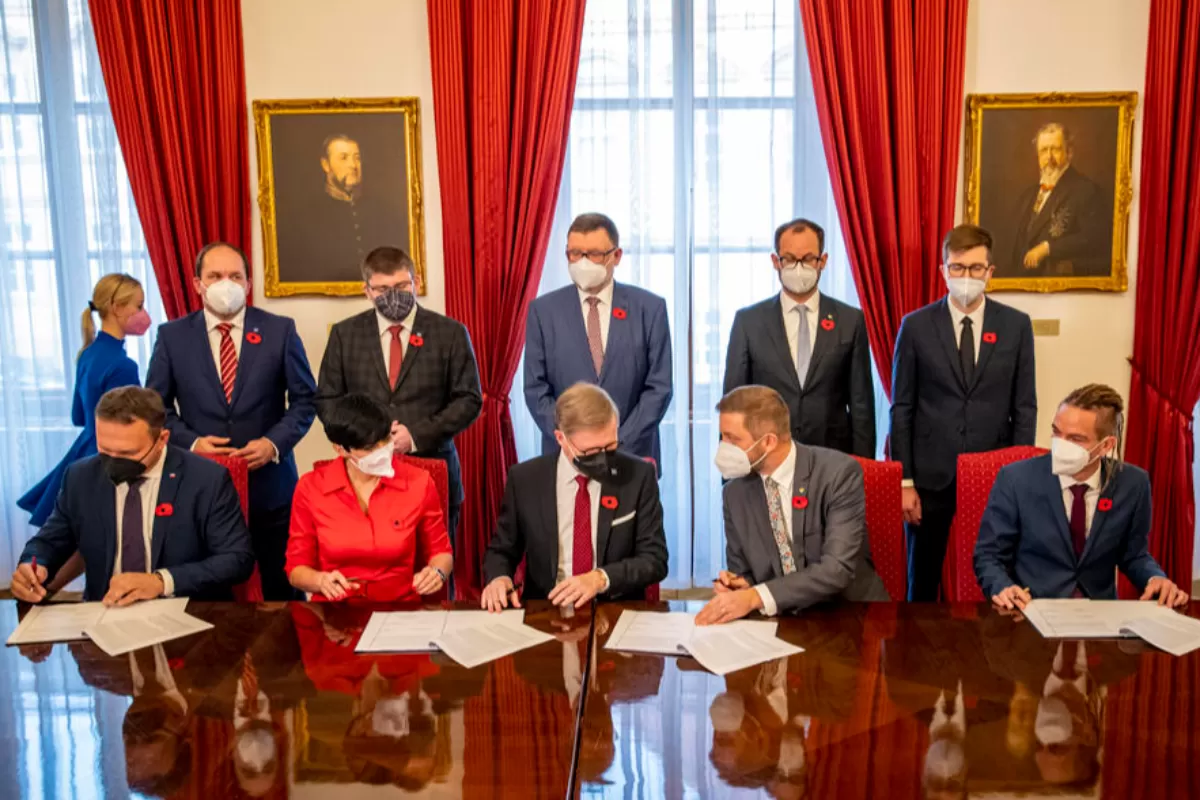
The Czech Republic is heading towards a new government. There is not only a handover of power between the current ruling coalition and the opposition, but there is also a change of approach to a number of key issues, including foreign policy. Until now, this has been influenced mainly by Prime Minister Andrej Babiš or by the foreign ministers of the Social Democratic party – and also by President Miloš Zeman, who has maneuvered the country mainly eastwards, towards Russia and China. All these actors are now essentially out of the picture.
Let me remind you: the opposition won the most seats in the Chamber of Deputies at the October 8 and 9 elections, and while they do disagree on a number of programmatic points, when it comes to foreign policy all five members of the emerging coalition (ODS, Christian Democrats, TOP 09, Mayors and Independents and Pirates) speak with one voice about the pro-Western direction of the country and the return of the policy of promoting human rights in the world.
"The Czech Republic must be an active member of the European Union and NATO, defending the interests of its citizens. Foreign policy will have an unquestionable Euro-Atlantic orientation, an emphasis on stable partnerships with democratic countries around the world and on the protection of human rights and democracy," the coalition agreement reads.
Since the establishment of the independent Czech Republic, the promotion of human rights in the world has been one of the pillars of its foreign policy, with President Václav Havel being the main bearer of this ethos. Around the time of the first Czech president's death (2011), the situation began to change – already the civil-democratic Prime Minister Petr Nečas (2010–2013) had emphasised a pragmatic approach to foreign policy, including towards Russia and China, while President Miloš Zeman, after his election in 2013, began to promote even more intensively the alleged economic benefits as the decisive view. In his conception, this meant strengthening cooperation primarily with the regimes in Moscow and Beijing, ambitious proclamations about the huge volume of planned investments (which never materialized) and ignoring problematic issues.
Even with Zeman's efforts, relations with the two powers are not very good right now. In the case of Russia, relations are essentially frozen after the revelation of the involvement of GRU agents in the explosions at the munitions depot in Vrbice – both countries expelled most of each other's diplomats in the spring.
With China, at first it looked like there would be very intense cooperation and billions of dollars of investment in the Czech Republic, but this never came, and relations eventually cooled because of the Senate President's trip to Taiwan last year, which the President and his people tried in vain to prevent. Both Russia and China were furthermore excluded from the tender for the completion of the Dukovany nuclear power plant.
Miloš Zeman, whose second term ends in the spring of 2023, has long made it clear that he is a force to be reckoned with. He has promised to appoint Andrej Babiš as prime minister practically regardless of the actual parliamentary majority. In the past, he has also repeatedly refused to appoint a candidate who did not suit him as a minister – including as foreign minister.
But the situation has changed radically in recent weeks. Firstly, the elections have turned out in such a way that the distribution of forces in the Chamber of Deputies does not give Babiš the slightest chance of forming a government – the former opposition parties have 108 of 200 MPs, while the Social Democrats and Communists, with whom Babiš has ruled so far, did not make it into the Chamber.
Secondly, President Zeman's health deteriorated sharply in early autumn. First, he was hospitalized for eight days in mid-September, did not appear in public after his release, and finally was taken back to the hospital the day after the election in apparent unconsciousness. The Office of the President of the Republic did not report on his condition throughout this time, so partial information could only be obtained through the media. The President suffers from serious liver problems, which causes him further health complications – ascites, i.e. the accumulation of water in the abdominal cavity, and hepatic encephalopathy, which negatively affects his cognitive abilities.
Zeman's condition has been stabilised and improved – in early November he was able to give his first interview in which he explained that Babiš had given up the opportunity to form a government and that he was ready to appoint the leader of the winning Spolu (Together) coalition, Petr Fiala, as prime minister as soon as possible. The president has already entrusted him with negotiations on the formation of a new government. He plans to start meetings with politicians in his hospital room this week.
Zeman's response may also be due to the fact that for the first time he is opposed by a clear political majority in both chambers of Parliament. Moreover, as recently as late October, it seemed very real that the Senate and then the new deputies in the lower chamber were vote to transfer the president’s powers to other constitutional officials because of his inability to hold office. This has been abandoned for the time being, given the improvement in Zeman's condition. According to doctors, the president's health does not allow him to devote himself fully to his work duties, which means, in other words, that he can devote himself to some of his duties.
Given the above, it is unlikely that Zeman would go into direct conflict with the new Prime Minister and refuse to appoint any of the proposed ministers. This is not even the case with the candidate for the post of foreign minister, Jan Lipavský, who is nominated by the Pirates as the weakest of the coalition parties. Lipavský was deputy chairman of the Foreign Affairs Committee in the outgoing Chamber of Deputies (he was not elected to the new Parliament in October) and from that position he has been a strong critic of Russia and China, speaking directly against the interests represented by Zeman and his entourage.
As a ministerial candidate, Lipavský now appears more restrained, yet he makes his foreign policy orientation clear. He believes that the Czech Republic needs to reassess its expectations concerning Russia in political and economic terms.
"In a situation where only taunts are coming from the Russian side, I cannot imagine that the Czech Republic would come up with an offer for mutual dialogue that would arouse real interest among the Russian leadership. We can start communicating with Russia when there is a partner who wants to communicate with us. Nothing like that is coming from Russia. There is no partner on the Russian side to talk to," Lipavský said in an interview with Deník N.
He has a similarly skeptical view of cooperation with Peking. "China is on the rise globally and the basic problem is that it has never accepted the basic rules of the international order on which the Czech Republic depends. This has given rise to a lot of friction and the US has devoted much of its attention to the Indo-Pacific. We need to take note of this orientation and seek the most appropriate position for the Czech Republic at EU level. China will remain an important trading partner, but we can no longer imagine that it will be an important partner in terms of foreign investment. Moreover, investments in China do not have the same level of protection as in the developed world," he explains.
At the same time, he suggests that he would like to return a human rights dimension to foreign policy. "When I became a minister and go on a foreign trip, I will raise absolutely all issues, including human rights, even in countries like Russia and China," he remarks.
As noted, the coalition programme also envisages a return to human rights policies. "Supporting democracy, human rights and civil society is morally right, but it is also good for our country. In the past, our human rights and transformation policies have managed to secure us a place at the centre of European politics. We will renew the tradition of 'Havel-style' foreign policy, including support for development and transition cooperation," the document quoted above reads.
The change of government in the Czech Republic and the transformation of foreign policy may also have a pan-European dimension. The Czech Republic will hold the Presidency of the Council of the European Union in the second half of 2022.
Prime Minister Babiš has often spoken of this task with disdain, and critics say his government has underestimated the presidency in budgetary terms. The new government has not yet come up with a concrete idea of how it would handle the presidency. However, it promises in its programme to "professionally and responsibly prepare the Czech Presidency of the EU Council and to ensure that the benefits for the Czech Republic are long-lasting".
When the new government will be formed will depend mainly on Zeman, who will be in hospital for a few more weeks.



